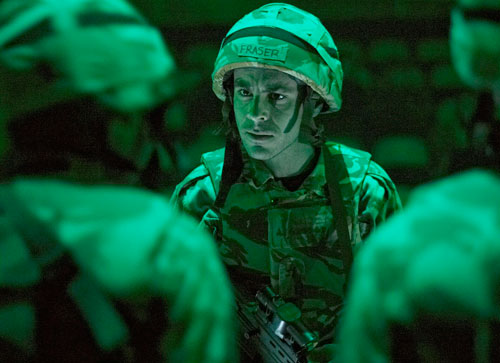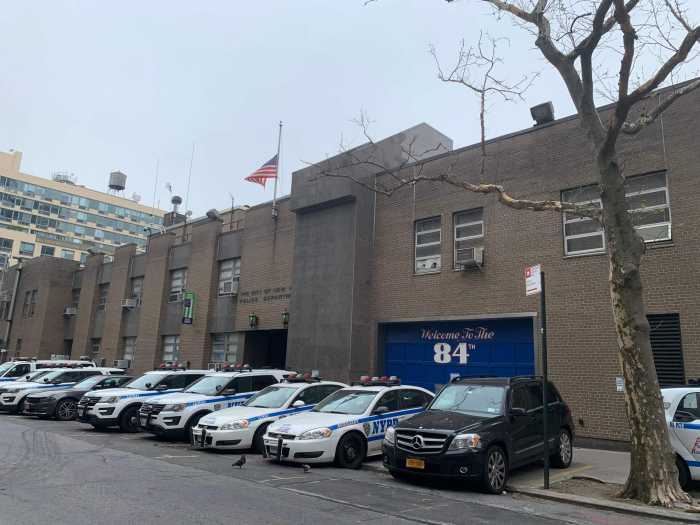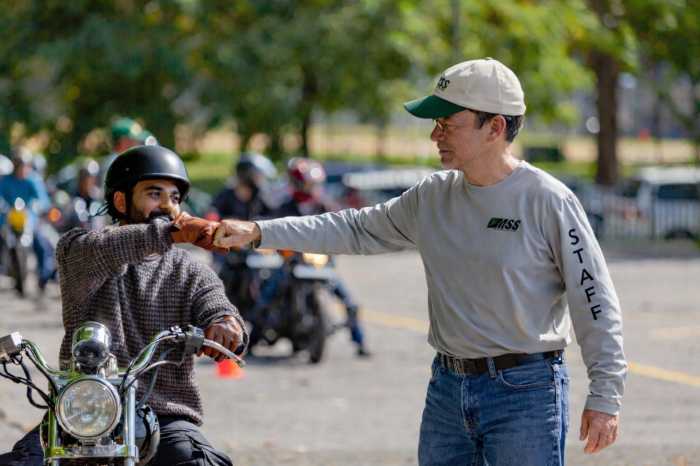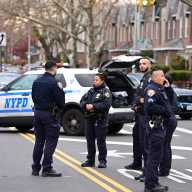The machismo, the gore, the heroism, the boredom — these are the standard themes of art about war. We’ve seen it all before, and yet those of us who were not in the theater of operations have no idea what war is actually like from sitting in a regular theater.
And then there’s “Black Watch,” the National Theatre of Scotland’s searing take on the U.S.-led Iraq War. With soldiers performing three feet from the audience, which is seated on both sides of the stage, and actors moving seamlessly between battle-ready soldier and post-traumatic-stress victims being interviewed for a banal research project, we get a little closer to understanding both what it is like to be there and, more important, what it’s like to come back.
The production is back through Nov. 30 at St. Ann’s Warehouse, where it had a sold-out run last winter — and it has lost none of its impact.
“Black Watch” centers around a Scottish Army regiment’s real experience in Iraq in 2003 after the United States requested that British forces secure the most-dangerous territory in the country. As Americans, we rarely get to hear how the rest of the world — or at least, our allies in kilts — view our “cowboy” approach to foreign policy. For this perspective alone, “Black Watch” is a must see.
But Gregory Burke’s drama is not only about the battlefield, but about the return home, when the wounds actually kick in. Culled from hours of interviews with Iraq War veterans, Burke’s play is about the duality of war in its expertly spun and terrifically crafted staging and in its message.
When the soldiers are on the battlefield, they complain that everyone at home wants to know what war “is like.” When they’re home in the pub, everyone wants to know what it’s like to be home again.
The audience is in on the joke, of course, because both phases of this soldiers story is played out only inches away from viewers.
The innovative performance includes complex battlefield scenes, intense acrobatics and, of course, bagpipes. There are strobe lights and staccato gunshot sound effects and humor in the face of fear. Watching the actors tear about the stage leaves the audience short of breath.
Of particular note is the scene in which the main character narrates the regiment’s 300-year history. The audience is literally walked through the story, as the actor struts across a red carpet while his castmates dress and redress him in each era’s modified uniform. The choreography is astounding and perfectly executed. No one misses a beat.
The soldiers — and the actors do become soldiers in this play — are put through their paces, with elaborate marching patterns and serious physical endurance during many scenes. Most interesting is the army-like precision of each movement itself. No actor moves from one spot without a place to land, be it while marching or at the pub, where they hold pool cues and lunge at the researcher (and his annoying questions) with simultaneous ferocity.
Such banality serves the exact point of the play: the soldiers don’t quite know why they’re there, but deal with the circumstances as best they can. And how do you sum up something you’re not totally sure you understand?
What sets this war drama apart is the immediacy of battle in a theater. The homoeroticism and bro-mantic relationships follow from war to bar, but what we see back home, and tangibly in front of us, is instead how the war affected each soldier. What the soldiers don’t know is that the firefight they wanted in Iraq will actually be the fight to return home and, naturally, face the question about what “it” was like.
I can’t pretend I know, as I haven’t been to Iraq or to war — but I feel like I’ve followed someone else there, having seen “Black Watch.” And it’s enough to know that it’s a place where we’re dragging in a lot of unwitting guests, willing to go for their own motives but struggling to ever fully come back.
“Black Watch” runs Oct. 9–Nov. 30 at St. Ann’s Warehouse (38 Water St., between Main and Dock streets in DUMBO). Tickets start at $55. Call (718) 254-8779 for info.
























